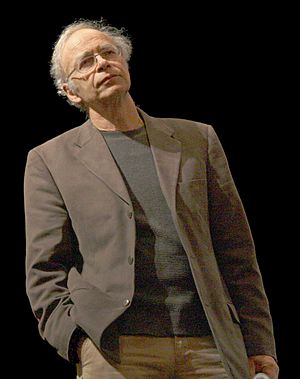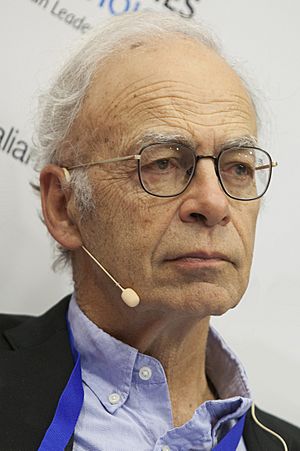Peter Singer facts for kids
Quick facts for kids
Peter Singer
|
|
|---|---|
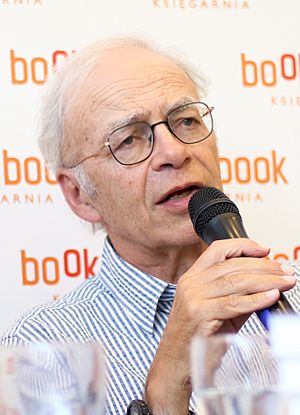
Singer in 2017
|
|
| Born |
Peter Albert David Singer
6 July 1946 |
| Education |
|
|
Notable work
|
|
| Spouse(s) |
Renata Diamond
(m. 1968) |
| Awards |
|
| School | Analytic philosophy Utilitarianism |
| Institutions |
|
| Thesis | Why Should I Be Moral? (1969) |
| Academic advisors | R. M. Hare (BPhil advisor) |
|
Main interests
|
|
|
Notable ideas
|
|
|
Influences
|
|
|
Influenced
|
|
Peter Albert David Singer AC (born 6 July 1946) is an Australian moral philosopher and the Ira W. DeCamp Professor of Bioethics at Princeton University. He specialises in applied ethics, approaching the subject from a secular, utilitarian perspective. He wrote the book Animal Liberation (1975), in which he argues for vegetarianism, and the essay "Famine, Affluence, and Morality", which favours donating to help the global poor. For most of his career, he was a preference utilitarian, but he revealed in The Point of View of the Universe (2014), coauthored with Katarzyna de Lazari-Radek, that he had become a hedonistic utilitarian.
On two occasions, Singer served as chair of the philosophy department at Monash University, where he founded its Centre for Human Bioethics. In 1996 he stood unsuccessfully as a Greens candidate for the Australian Senate. In 2004 Singer was recognised as the Australian Humanist of the Year by the Council of Australian Humanist Societies. In 2005, The Sydney Morning Herald placed him among Australia's ten most influential public intellectuals. Singer is a cofounder of Animals Australia and the founder of The Life You Can Save.
Contents
Biography
Singer's parents were Austrian Jews who immigrated to Australia from Vienna after Austria's annexation by Nazi Germany in 1938. They settled in Melbourne, where Singer was born in 1946. His grandparents were less fortunate: his paternal grandparents were taken by the Nazis to Łódź, and were most likely murdered since they were never heard from again; his maternal grandfather David Ernst Oppenheim (1881–1943), an educator and psychologist who collaborated with Sigmund Freud and Alfred Adler, was murdered in the Theresienstadt concentration camp. Oppenheim was a member of the Vienna Psychoanalytic Society and wrote a joint article with Sigmund Freud, before joining the Adlerian Society for Individual Psychology. Singer later wrote a biography of Oppenheim.
Singer is an atheist and was raised in a prosperous, nonreligious family. His father had a successful business importing tea and coffee. His family rarely observed Jewish holidays, and Singer declined to have a Bar Mitzvah. Singer attended Preshil and later Scotch College. After leaving school, Singer studied law, history, and philosophy at the University of Melbourne, earning a bachelor's degree in 1967. He has explained that he elected to major in philosophy after his interest was piqued by discussions with his sister's then-boyfriend.
He earned a master's degree for a thesis entitled Why Should I Be Moral? at the same university in 1969. He was awarded a scholarship to study at the University of Oxford and obtained from there a Bachelor of Philosophy in 1971 with a thesis on civil disobedience supervised by R. M. Hare and published as a book in 1973. Singer names Hare, Australian philosopher H. J. McCloskey and British philosopher J.L.H. Thomas, who taught him "how to read and understand Hegel", as his most important mentors. In the preface to Hegel: A Very Short Introduction, Singer recalls his time in Thomas' "remarkable" classes at Oxford where students were forced to "probe passages of the Phenomenology sentence by sentence, until they yielded their meaning."
One day at Balliol College in Oxford, he had what he refers to as probably the decisive formative experience of his life. He was having a discussion after class with fellow graduate student Richard Keshen, a Canadian, who would later become a professor at Cape Breton University. During their lunch Keshen opted to have a salad after being told that the spaghetti sauce contained meat. Singer had the spaghetti. Singer eventually questioned Keshen about his reason for avoiding meat. Keshen explained his ethical objections. Singer would later state, "I'd never met a vegetarian who gave such a straightforward answer that I could understand and relate to". Keshen later introduced Singer to his vegetarian friends. Singer was able to find one book in which he could read up on the issue (Animal Machines by Ruth Harrison) and within a week or two he approached his wife saying that he thought they needed to make a change to their diet and that he did not think they could justify eating meat.
After spending three years as a Radcliffe lecturer at University College, Oxford, he was a visiting professor at New York University for 16 months. In 1977 he returned to Melbourne where he spent most of his career, aside from appointments as visiting faculty abroad, until his move to Princeton in 1999. In June 2011 it was announced he would join the professoriate of New College of the Humanities, a private college in London, in addition to his work at Princeton. He also has been a regular contributor to Project Syndicate since 2001.
According to philosopher Helga Kuhse, Singer is almost certainly the best-known and most widely read of all contemporary philosophers. Michael Specter wrote that Singer is among the most influential of contemporary philosophers.
Applied ethics
Singer's Practical Ethics (1979) analyzes why and how living beings' interests should be weighed. His principle of equal consideration of interests does not dictate equal treatment of all those with interests, since different interests warrant different treatment. All have an interest in avoiding pain, for instance, but relatively few have an interest in cultivating their abilities. Not only does his principle justify different treatment for different interests, but it allows different treatment for the same interest when diminishing marginal utility is a factor. For example, this approach would privilege a starving person's interest in food over the same interest of someone who is only slightly hungry.
Among the more important human interests are those in avoiding pain, in developing one's abilities, in satisfying basic needs for food and shelter, in enjoying warm personal relationships, in being free to pursue one's projects without interference, "and many others". The fundamental interest that entitles a being to equal consideration is the capacity for "suffering and/or enjoyment or happiness". Singer holds that a being's interests should always be weighed according to that being's concrete properties. He favors a "journey" model of life, which measures the wrongness of taking a life by the degree to which doing so frustrates a life journey's goals. So taking a life is less wrong at the beginning, when no goals have been set, and at the end, when the goals have either been met or are unlikely to be accomplished. The journey model is tolerant of some frustrated desire and explains why persons who have embarked on their journeys are not replaceable. Only a personal interest in continuing to live brings the journey model into play. This model also explains the priority that Singer attaches to interests over trivial desires and pleasures.
Ethical conduct is justified by reasons that go beyond prudence to "something bigger than the individual", addressing a larger audience. Singer thinks this going-beyond identifies moral reasons as "somehow universal", specifically in the injunction to 'love thy neighbour as thyself', interpreted by him as demanding that one give the same weight to the interests of others as one gives to one's own interests. This universalising step, which Singer traces from Kant to Hare, is crucial and sets him apart from those moral theorists, from Hobbes to David Gauthier, who tie morality to prudence. Universalisation leads directly to utilitarianism, Singer argues, on the strength of the thought that one's own interests cannot count for more than the interests of others.
Taking these into account, one must weigh them up and adopt the course of action that is most likely to maximise the interests of those affected; utilitarianism has been arrived at. Singer's universalising step applies to interests without reference to who has them, whereas the Kantian's applies to the judgments of rational agents (in Kant's kingdom of Ends, or Rawls's original position, etc.). Singer regards Kantian universalisation as unjust to animals. As for the Hobbesians, Singer attempts a response in the final chapter of Practical Ethics, arguing that self-interested reasons support adoption of the moral point of view, such as 'the paradox of hedonism', which counsels that happiness is best found by not looking for it, and the need most people feel to relate to something larger than their own concerns.
Singer identifies as a sentientist. Sentientism is an ethical position that grants moral consideration to all sentient beings.
Effective altruism and world poverty
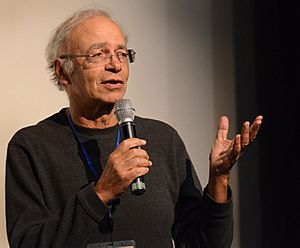
Singer's ideas have contributed to the rise of effective altruism. He argues that people should try not only to reduce suffering but to reduce it in the most effective manner possible. While Singer has previously written at length about the moral imperative to reduce poverty and eliminate the suffering of nonhuman animals, particularly in the meat industry, he writes about how the effective altruism movement is doing these things more effectively in his 2015 book The Most Good You Can Do. He is a board member of Animal Charity Evaluators, a charity evaluator used by many members of the effective altruism community which recommends the most cost-effective animal advocacy charities and interventions.
His own organisation, The Life You Can Save (TLYCS), also recommends a selection of charities deemed by charity evaluators such as GiveWell to be the most effective when it comes to helping those in extreme poverty. TLYCS was founded after Singer released his 2009 eponymous book, in which he argues more generally in favour of giving to charities that help to end global poverty. In particular, he expands upon some of the arguments made in his 1972 essay "Famine, Affluence, and Morality", in which he posits that citizens of rich nations are morally obligated to give at least some of their disposable income to charities that help the global poor. He supports this using the "drowning child analogy", which states that most people would rescue a drowning child from a pond, even if it meant that their expensive clothes were ruined, so we clearly value a human life more than the value of our material possessions. As a result, we should take a significant portion of the money that we spend on our possessions and instead donate it to charity.
Since November 2009, Singer is a member of Giving What We Can, an international organisation whose members pledge to give at least 10% of their income to effective charities.
Animal liberation and speciesism
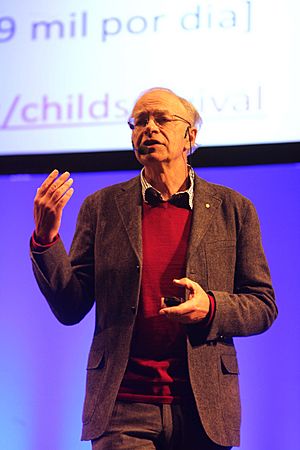
Published in 1975, Animal Liberation has been cited as a formative influence on leaders of the modern animal liberation movement. The central argument of the book is an expansion of the utilitarian concept that "the greatest good of the greatest number" is the only measure of good or ethical behaviour, and Singer believes that there is no reason not to apply this principle to other animals, arguing that the boundary between human and "animal" is completely arbitrary. There are far more differences between a great ape and an oyster, for example, than between a human and a great ape, and yet the former two are lumped together as "animals", whereas we are considered "human" in a way that supposedly differentiates us from all other "animals".
He popularised the term "speciesism", which had been coined by English writer Richard D. Ryder to describe the practice of privileging humans over other animals, and therefore argues in favour of the equal consideration of interests of all sentient beings. In Animal Liberation, Singer argues in favour of vegetarianism and against most animal experimentation. He stated in a 2006 interview that he doesn't eat meat and that he's been a vegetarian since 1971. He also said that he has "gradually become increasingly vegan" and that "I am largely vegan but I'm a flexible vegan. I don't go to the supermarket and buy non-vegan stuff for myself. But when I'm traveling or going to other people's places I will be quite happy to eat vegetarian rather than vegan."
More recently, Singer has stated that he isn't fully vegan, because he will occasionally consume oysters, mussels and clams due to their lack of a central nervous system. According to Singer, meat-eating can be ethically permissible if "farms really give the animals good lives, and then humanely kill them, preferably without transporting them to slaughterhouses or disturbing them. In Animal Liberation, I don't really say that it's the killing that makes [meat-eating] wrong, it's the suffering".
In an article for the online publication Chinadialogue, Singer called Western-style meat production cruel, unhealthy, and damaging to the ecosystem. He rejected the idea that the method was necessary to meet the population's increasing demand, explaining that animals in factory farms have to eat food grown explicitly for them, and they burn up most of the food's energy just to breathe and keep their bodies warm. In a 2010 Guardian article he titled, "Fish: the forgotten victims on our plate", Singer drew attention to the welfare of fish. He quoted author Alison Mood's startling statistics from a report she wrote, which was released on fishcount.org.uk just a month before the Guardian article. Singer states that she "has put together what may well be the first-ever systematic estimate of the size of the annual global capture of wild fish. It is, she calculates, in the order of one trillion, although it could be as high as 2.7tn."
Some chapters of Animal Liberation are dedicated to criticising testing on animals but, unlike groups such as PETA, Singer is willing to accept testing when there is a clear benefit for medicine. In November 2006, Singer appeared on the BBC programme Monkeys, Rats and Me: Animal Testing and said that he felt that Tipu Aziz's experiments on monkeys for research into treating Parkinson's disease could be justified. Whereas Singer has continued since the publication of Animal Liberation to promote vegetarianism and veganism, he has been much less vocal in recent years on the subject of animal experimentation.
Singer has defended some of the actions of the Animal Liberation Front, such as the stealing of footage from Dr. Thomas Gennarelli's laboratory in May 1984 (as shown in the documentary Unnecessary Fuss), but he has condemned other actions such as the use of explosives by some animal-rights activists and sees the freeing of captive animals as largely futile when they are easily replaced.
Singer features in the 2017 documentary Empathy, directed by Ed Antoja, which aims to promote a more respectful way of life towards all animals. The documentary won the "Public Choice Award" of the Greenpeace Film Festival.
Other views
Meta-ethical views
In the past, Singer has not held that objective moral values exist, on the basis that reason could favour both egoism and equal consideration of interests. Singer himself adopted utilitarianism on the basis that people's preferences can be universalised, leading to a situation where one takes the "point of view of the universe" and "an impartial standpoint". But in the Second Edition of Practical Ethics, he concedes that the question of why we should act morally "cannot be given an answer that will provide everyone with overwhelming reasons for acting morally".
However, when co-authoring The Point of View of the Universe (2014), Singer shifted to the position that objective moral values do exist, and defends the 19th century utilitarian philosopher Henry Sidgwick's view that objective morality can be derived from fundamental moral axioms that are knowable by reason. Additionally, he endorses Derek Parfit's view that there are object-given reasons for action. Furthermore, Singer and Katarzyna de Lazari-Radek (the co-author of the book) argue that evolutionary debunking arguments can be used to demonstrate that it is more rational to take the impartial standpoint of "the point of view of the universe", as opposed to egoism—pursuing one's own self-interest—because the existence of egoism is more likely to be the product of evolution by natural selection, rather than because it is correct, whereas taking an impartial standpoint and equally considering the interests of all sentient beings is in conflict with what we would expect from natural selection, meaning that it is more likely that impartiality in ethics is the correct stance to pursue.
Political views
Whilst a student in Melbourne, Singer campaigned against the Vietnam War as president of the Melbourne University Campaign Against Conscription. ..... Singer joined the Australian Labor Party in 1974, but resigned after disillusionment with the centrist leadership of Bob Hawke. In 1992, he became a founding member of the Victorian Greens. He has run for political office twice for the Greens: in 1994 he received 28% of the vote in the Kooyong by-election, and in 1996 he received 3% of the vote when running for the Senate (elected by proportional representation). Before the 1996 election, he co-authored a book The Greens with Bob Brown.
In A Darwinian Left, Singer outlines a plan for the political left to adapt to the lessons of evolutionary biology. He says that evolutionary psychology suggests that humans naturally tend to be self-interested. He further argues that the evidence that selfish tendencies are natural must not be taken as evidence that selfishness is "right." He concludes that game theory (the mathematical study of strategy) and experiments in psychology offer hope that self-interested people will make short-term sacrifices for the good of others, if society provides the right conditions. Essentially, Singer claims that although humans possess selfish, competitive tendencies naturally, they have a substantial capacity for cooperation that also has been selected for during human evolution. Singer's writing in Greater Good magazine, published by the Greater Good Science Center of the University of California, Berkeley, includes the interpretation of scientific research into the roots of compassion, altruism, and peaceful human relationships.
Singer has criticised the United States for receiving "oil from countries run by dictators ... who pocket most of the" financial gains, thus "keeping the people in poverty." Singer believes that the wealth of these countries "should belong to the people" within them rather than their "de facto government. In paying dictators for their oil, we are in effect buying stolen goods, and helping to keep people in poverty." Singer holds that America "should be doing more to assist people in extreme poverty". He is disappointed in U.S. foreign aid policy, deeming it "a very small proportion of our GDP, less than a quarter of some other affluent nations." Singer maintains that little "private philanthropy from the U.S." is "directed to helping people in extreme poverty, although there are some exceptions, most notably, of course, the Gates Foundation."
He added that "[i]f we ever do find a better system, I'll be happy to call myself an anti-capitalist".
Similarly, in his book Marx, Singer is sympathetic to Marx's criticism of capitalism, but is skeptical about whether a better system is likely to be created, writing: "Marx saw that capitalism is a wasteful, irrational system, a system which controls us when we should be controlling it. That insight is still valid; but we can now see that the construction of a free and equal society is a more difficult task than Marx realised."
Singer is opposed to the death penalty, claiming that it does not effectively deter the crimes for which it is the punitive measure, and that he cannot see any other justification for it.
In 2010, Singer signed a petition renouncing his right of return to Israel, because it is "a form of racist privilege that abets the colonial oppression of the Palestinians."
In 2016, Singer called on Jill Stein to withdraw from the US presidential election in states that were close between Hillary Clinton and Donald Trump, on the grounds that "The stakes are too high". He argued against the view that there was no significant difference between Clinton and Trump, whilst also saying that he would not advocate such a tactic in Australia's electoral system, which allows for ranking of preferences.
When writing in 2017 on Trump's denial of climate change and plans to withdraw from the Paris accords, Singer advocated a boycott of all consumer goods from the United States to pressure the Trump administration to change its environmental policies.
In 2021, Singer described the War on Drugs as an expensive, ineffective and extremely harmful policy.
... and ...
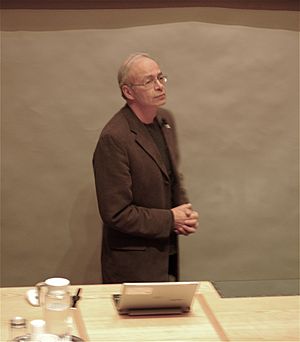
Singer holds that the right to life is essentially tied to a being's capacity to hold preferences, which in turn is essentially tied to a being's capacity to feel pain and pleasure.
..... In sum, Singer argues that a fetus lacks personhood.
....." He deems it not "unreasonable to hold that an individual human life begins at conception. If it doesn't, then it begins about 14 days later, when it is no longer possible for the embryo to divide into twins or other multiples." ....." ....."
..... .....
Bioethicists associated with the disability rights and disability studies communities have argued that his epistemology is based on ableist conceptions of disability. Singer's positions have also been criticised by some advocates for disability rights and right-to-life supporters, concerned with what they see as his attacks upon human dignity. Religious critics have argued that Singer's ethics ignores and undermines the traditional notion of the sanctity of life. Singer agrees and believes the notion of the sanctity of life ought to be discarded as outdated, unscientific, and irrelevant to understanding problems in contemporary bioethics. Disability rights activists have held many protests against Singer at Princeton University and at his lectures over the years. Singer has replied that many people judge him based on secondhand summaries and short quotations taken out of context, not on his books or articles, and that his aim is to elevate the status of animals, not to lower that of humans.
American publisher Steve Forbes ceased his donations to Princeton University in 1999 because of Singer's appointment to a prestigious professorship. Nazi-hunter Simon Wiesenthal wrote to organisers of a Swedish book fair to which Singer was invited that "A professor of morals ... who justifies the right to kill handicapped newborns ... is in my opinion unacceptable for representation at your level." Marc Maurer, president of the National Federation of the Blind, criticised Singer's appointment to the Princeton faculty in a banquet speech at the organisation's national convention in July 2001, claiming that Singer's support for euthanising disabled babies could lead to disabled older children and adults being valued less as well. Conservative psychiatrist Theodore Dalrymple wrote in 2010 that Singerian moral universalism is "preposterous—psychologically, theoretically, and practically".
In 2002, disability rights activist Harriet McBryde Johnson debated Singer, challenging his belief that it is morally permissible to euthanise newborn children with severe disabilities.
.....
Singer has experienced the complexities of some of these questions in his own life. His mother had Alzheimer's disease. He said, "I think this has made me see how the issues of someone with these kinds of problems are really very difficult". In an interview with Ronald Bailey, published in December 2000, he explained that his sister shares the responsibility of making decisions about his mother. He did say that, if he were solely responsible, his mother might not continue to live.
Surrogacy
In 1985, Singer wrote a book with the physician Deanne Wells arguing that surrogate motherhood should be allowed and regulated by the state by establishing nonprofit 'State Surrogacy Boards', which would ensure fairness between surrogate mothers and surrogacy-seeking parents. Singer and Wells endorsed both the payment of medical expenses endured by surrogate mothers and an extra "fair fee" to compensate the surrogate mother.
Religion
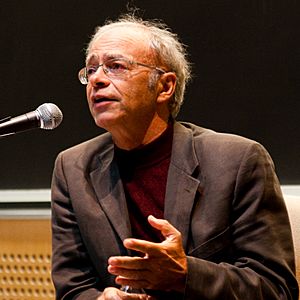
Singer was a speaker at the 2012 Global Atheist Convention. He has debated with Christians including John Lennox and Dinesh D'Souza. Singer has pointed to the problem of evil as an objection against the Christian conception of God. He stated: "The evidence of our own eyes makes it more plausible to believe that the world was not created by any god at all. If, however, we insist on believing in divine creation, we are forced to admit that the god who made the world cannot be all-powerful and all good. He must be either evil or a bungler." In keeping with his considerations of nonhuman animals, Singer also takes issue with the original sin reply to the problem of evil, saying that, "animals also suffer from floods, fires, and droughts, and, since they are not descended from Adam and Eve, they cannot have inherited original sin."
Medical intervention in the aging process
Singer does worry that "If we discover how to slow aging, we might have a world in which the poor majority must face death at a time when members of the rich minority are only a 10th of the way through their expected lifespans," thus risking "that overcoming aging will increase the stock of injustice in the world." However, Singer cautiously highlights de Grey's view that as with other medical developments, they will reach the more economically disadvantaged over time once developed, whereas they can never do so if they are not. As to the concern that longer lives might contribute to overpopulation, Singer notes that "success in overcoming aging could itself ... delay or eliminate menopause, enabling women to have their first children much later than they can now" and thus slowing the birth rate, and also that technology may reduce the consequences of rising human populations by (for instance) enabling more zero-greenhouse gas energy sources.
In 2012, Singer's department sponsored the "Science and Ethics of Eliminating Aging" seminar at Princeton, featuring de Grey.
Protests
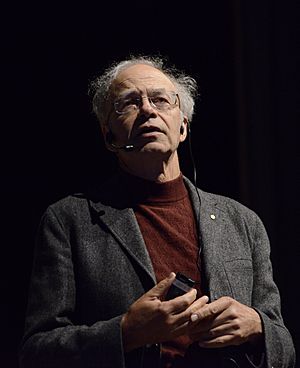
In 1989 and 1990, Singer's work was the subject of a number of protests in Germany. ..... The protests led to the course being shut down.
When Singer tried to speak during a lecture at Saarbrücken, he was interrupted by a group of protesters including advocates for disability rights. One of the protesters expressed that entering serious discussions would be a tactical error.
The same year, Singer was invited to speak in Marburg at a European symposium on "Bioengineering, Ethics and Mental Disability". The invitation was fiercely attacked by leading intellectuals and organisations in the German media, with an article in Der Spiegel comparing Singer's positions to Nazism. Eventually, the symposium was cancelled and Singer's invitation withdrawn.
A lecture at the Zoological Institute of the University of Zurich was interrupted by two groups of protesters. The first group was a group of disabled people who staged a brief protest at the beginning of the lecture. ..... At the end of this protest, when Singer tried to address their concerns, a second group of protesters rose and began chanting "Singer raus! Singer raus!" ("Singer out!" in German) When Singer attempted to respond, a protester jumped on stage and grabbed his glasses, and the host ended the lecture. Singer explains "my views are not threatening to anyone, even minimally" and says that some groups play on the anxieties of those who hear only keywords that are understandably worrying (given the constant fears of ever repeating the Holocaust) if taken with any less than the full context of his belief system.
In 1991, Singer was due to speak along with R. M. Hare and Georg Meggle at the 15th International Wittgenstein Symposium in Kirchberg am Wechsel, Austria. Singer has stated that threats were made to Adolf Hübner, then the president of the Austrian Ludwig Wittgenstein Society, that the conference would be disrupted if Singer and Meggle were given a platform. Hübner proposed to the board of the society that Singer's invitation (as well as the invitations of a number of other speakers) be withdrawn. The Society decided to cancel the symposium.
In an article originally published in The New York Review of Books, Singer argued that the protests dramatically increased the amount of coverage he received: "instead of a few hundred people hearing views at lectures in Marburg and Dortmund, several millions read about them or listened to them on television". Despite this, Singer argues that it has led to a difficult intellectual climate, with professors in Germany unable to teach courses on applied ethics and campaigns demanding the resignation of professors who invited Singer to speak.
Recognition
Singer was inducted into the United States Animal Rights Hall of Fame in 2000.
In June 2012, Singer was appointed a Companion of the Order of Australia (AC) for "eminent service to philosophy and bioethics as a leader of public debate and communicator of ideas in the areas of global poverty, animal welfare and the human condition."
Singer received Philosophy Now's 2016 Award for Contributions in the Fight Against Stupidity for his efforts "to disturb the comfortable complacency with which many of us habitually ignore the desperate needs of others ... particularly for this work as it relates to the Effective Altruism movement."
In 2018, Singer was noted in the book, Rescuing Ladybugs by author and animal advocate Jennifer Skiff as a "hero among heroes in the world", who, in arguing against speciesism "gave the modern world permission to believe what we innately know – that animals are sentient and that we have a moral obligation not to exploit or mistreat them." The book states that Singer's "moral philosophy on animal equality was sparked when he asked a fellow student at Oxford University a simple question about his eating habits."
In 2021, Singer was awarded the US$1-million Berggruen Prize, and decided to give it away. He decided, in particular, to give half of the prize money to his foundation The Life You Can Save, because "over the last three years, each dollar spent by it generated an average of $17 in donations for its recommended nonprofits". (He added he has never taken money for personal use from the organisation.) Moreover, he plans to donate more than a third of the money to organisations combating intensive animal farming, and recommended as effective by Animal Charity Evaluators.
For 2022 Singer received the BBVA Foundation Frontiers of Knowledge Award in the category of "Humanities and Social Sciences".
Personal life
Since 1968, he has been married to Renata Singer (née Diamond; b. 1947 Wałbrzych, Poland); they have three children: Ruth, a textile artist; Marion, law student and youth arts specialist; and Esther, linguist and teacher. Renata Singer is a novelist and author and has collaborated on publications with her husband. Until 2021 she was President of the Kadimah Jewish Cultural Centre and National Library in Melbourne.
See also
 In Spanish: Peter Singer para niños
In Spanish: Peter Singer para niños
- Animal liberationist
- Argument from marginal cases
- Demandingness objection
- Intrinsic value (animal ethics)
- List of animal rights advocates
- Utilitarian bioethics
- Veganism


